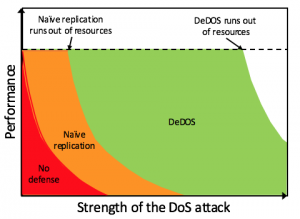DeDOS: Declarative Dispersion-Oriented Software
 The goal of this project is to create fundamentally new defenses against distributed denial-of-service (DDoS) attacks that can provide far greater resilience to these attacks compared to existing solutions. Today’s responses to DDoS attacks largely rely on old-school network-based filtering or scrubbing, which are slow and manual, and cannot handle new attacks. DeDOS takes a radically different approach that combines techniques from declarative programming, program analysis, and real-time resource allocation in the cloud.
The goal of this project is to create fundamentally new defenses against distributed denial-of-service (DDoS) attacks that can provide far greater resilience to these attacks compared to existing solutions. Today’s responses to DDoS attacks largely rely on old-school network-based filtering or scrubbing, which are slow and manual, and cannot handle new attacks. DeDOS takes a radically different approach that combines techniques from declarative programming, program analysis, and real-time resource allocation in the cloud.
 Rather than relying on traditional detection and mitigation techniques, the project aims to develop a new software architecture from the ground up that make it significantly harder for an attacker to slow down to system without expending large amounts of resources. For example, instead of running monolithic software and naively replicating it when under an attack, DeDOS logically and physically restructures complex software systems into smaller components that can react to attacks at a much finer granularity. DeDOS also uses state-of-the-art resource allocation algorithms to achieve near-optimal use of system resources and to support critical, time-sensitive applications, such as situational awareness.
Rather than relying on traditional detection and mitigation techniques, the project aims to develop a new software architecture from the ground up that make it significantly harder for an attacker to slow down to system without expending large amounts of resources. For example, instead of running monolithic software and naively replicating it when under an attack, DeDOS logically and physically restructures complex software systems into smaller components that can react to attacks at a much finer granularity. DeDOS also uses state-of-the-art resource allocation algorithms to achieve near-optimal use of system resources and to support critical, time-sensitive applications, such as situational awareness.
For more information, see the DeDOS Project and the Distributed Systems Laboratory.
Faculty
Sponsors
DARPA
Students and Postdocs
- Henri Maxime Demoulin
- Isaac Pedisich (programmer)
- Nik Sultana (postdoc)
- Robert DiMaiolo (MSE)
- Mark Lippincott (MSE)
- Chirag Shah (MSE)
- Bowen Wang (MSE)
Collaborators
Georgetown University and Rice University
